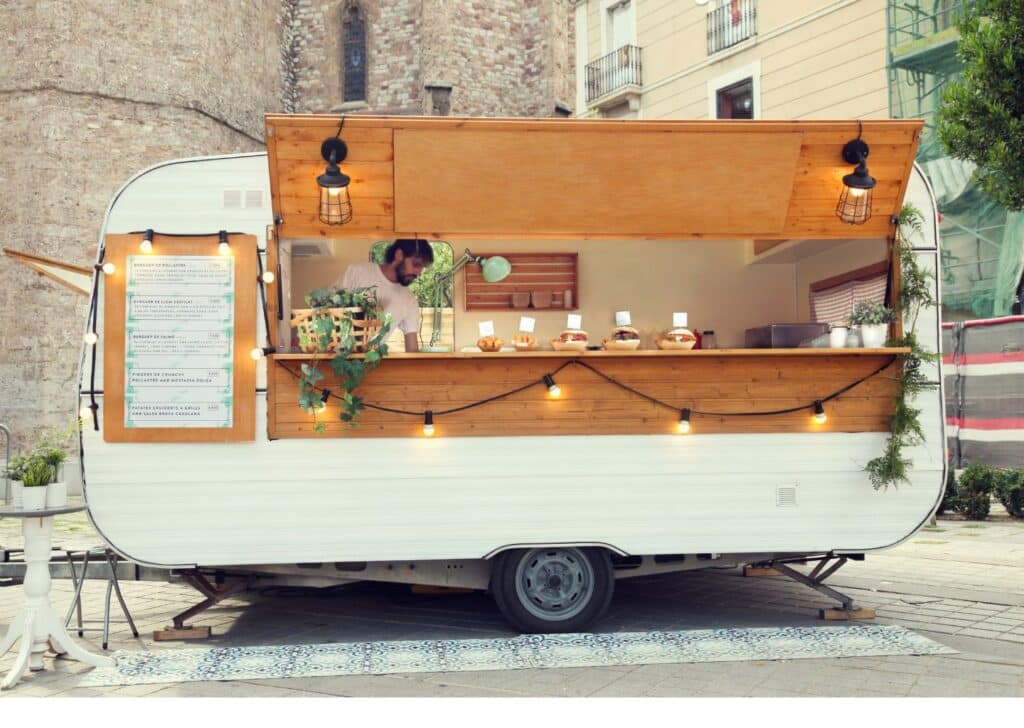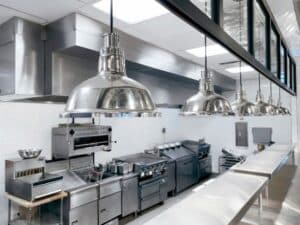If you’re venturing into the mobile food industry, one of the first decisions you’ll face is whether to invest in a food truck or a food trailer. While both options enable you to serve customers on the go, they come with distinct differences in mobility, cost, setup, and operational style. Understanding these differences will help you choose the right option for your business model and goals.
In this blog, we’ll compare the key aspects of food trucks and food trailers to help you make an informed decision.
What is a Food Truck?
A food truck is a fully integrated vehicle with a kitchen built into the truck itself. The driver’s cab and the kitchen are part of one unit, making the truck completely mobile and self-contained.
What is a Food Trailer?
A food trailer is a separate kitchen unit that must be towed by a vehicle, such as a truck or SUV. The trailer is stationary during service, and the tow vehicle detaches once the trailer is parked in its designated spot.
Key Factors to Consider: Food Trucks vs. Food Trailers
1. Mobility and Flexibility
- Food Truck:
- Food trucks are ideal for operators who need to move quickly and frequently between locations. Whether you want to hit multiple spots throughout the day or move from one city to another for special events, a food truck’s all-in-one mobility makes this easy.
- However, if the truck breaks down, your entire operation can be out of commission until repairs are completed.
- Food Trailer:
- Food trailers are towed by a separate vehicle, which makes them less mobile than food trucks. They are best suited for long-term or semi-permanent setups, such as food truck parks, festivals, or catered events. Once parked, the trailer remains stationary while the tow vehicle can be used elsewhere.
- If the tow vehicle breaks down, the trailer can still be used at its location, providing more operational flexibility in some cases.
2. Space and Kitchen Capacity
- Food Truck:
- Food trucks typically have a more compact kitchen, making them better suited for simple menus and small teams. The smaller space can limit your ability to store ingredients or prepare complex dishes, especially during busy periods.
- Perfect for quick-service foods like sandwiches, tacos, burgers, or coffee.
- Food Trailer:
- Food trailers usually offer more space for cooking and storage, allowing for larger or more complex menus. Trailers can accommodate larger teams, more equipment, and higher food production capacity, making them a great option for high-volume operations.
- This extra space is ideal if you plan to serve food that requires specialized equipment like grills, fryers, or pizza ovens.
3. Cost Considerations
- Food Truck:
- A food truck generally has a higher upfront cost because it combines the kitchen and the vehicle into one unit. Prices can range from $50,000 to over $200,000, depending on the size, equipment, and customization required. Used trucks can lower the price but may come with maintenance issues.
- Operating costs also tend to be higher due to vehicle upkeep, fuel, and the potential need for repairs that could temporarily shut down your business.
- Food Trailer:
- A food trailer is typically less expensive upfront, with costs ranging from $20,000 to $100,000 or more, depending on size and customization. However, you’ll also need to invest in a tow vehicle if you don’t already own one.
- Trailers often have lower maintenance costs since they do not have an engine or mechanical parts to worry about. This can make them more budget-friendly in the long term.
4. Licensing, Permits, and Regulations
- Food Truck:
- Food trucks usually face more complex regulations because of their mobility. You’ll need permits for each city or county you operate in, including health inspections, parking permits, and fire safety checks. Some locations may have strict zoning laws limiting where food trucks can park and serve.
- Food Trailer:
- Food trailers may face slightly less regulatory complexity, especially if they remain in one place for an extended period. However, you still need to comply with health codes, fire safety regulations, and any local permits required for your operating area. Being stationary for long periods may allow for easier management of inspections and compliance.
5. Operational Flexibility
- Food Truck:
- Food trucks offer unparalleled flexibility in terms of where and when you operate. You can change locations daily or even multiple times a day, catering to different customer bases in various areas. This makes them a great option for businesses that want to be constantly on the move, from city streets to private events.
- The mobility of food trucks also makes them perfect for catering and special events, where you can pull up, serve, and leave without too much hassle.
- Food Trailer:
- While food trailers are less flexible for short-notice moves, they are great for businesses looking to set up at semi-permanent or regular locations. Many food trailers find success in food truck parks, at festivals, or catering events where they can park and serve for extended periods.
- Trailers are also a good option for expanding an existing business. For example, if you have a brick-and-mortar restaurant, a trailer could serve as a satellite location without requiring a constant change of location.
6. Repair and Maintenance
- Food Truck:
- One disadvantage of food trucks is that if the vehicle needs repairs, your entire business can be put on hold. This can be costly, as both your kitchen and your transportation are out of service during repairs.
- Routine maintenance is required not only for the kitchen equipment but also for the vehicle itself, adding to operating costs.
- Food Trailer:
- Since a food trailer is a separate unit, the towing vehicle and trailer can be maintained independently. If the tow vehicle needs repairs, the trailer can still be functional, and vice versa. This can help avoid complete shutdowns due to vehicle issues.
- The lack of an engine or driving components in the trailer itself also means fewer potential mechanical problems to deal with.
7. Branding Opportunities
- Food Truck:
- A food truck offers high visibility as you drive around town. The truck itself becomes a moving billboard, advertising your brand wherever you go. The compact design can make for a more focused and impactful exterior, grabbing attention on busy streets.
- This is ideal if you want to generate buzz while traveling between locations.
- Food Trailer:
- Food trailers offer more surface area for branding, allowing for more creative and detailed designs. If you park in a high-traffic area or food truck park, a larger trailer offers more space for eye-catching graphics and branding elements.
- Trailers that remain in one place for extended periods can become a local fixture, building a loyal customer base over time.
Which Option is Right for You?
- Consider a Food Truck if:
- You want maximum mobility and the flexibility to serve at different locations throughout the day.
- You have a simpler menu and can operate efficiently in a smaller kitchen.
- You are ready to invest more upfront in exchange for the ability to move frequently.
- You plan to attend a lot of events, cater private functions, or test different markets regularly.
- Consider a Food Trailer if:
- You need more kitchen space to accommodate a larger menu or team.
- You plan to operate in a semi-permanent location, such as a food truck park or festival.
- You’re looking for a lower initial investment and more budget-friendly long-term maintenance.
- You want a larger space for branding and prefer to remain stationary during service.
Conclusion
Both food trucks and food trailers have their own unique advantages depending on your business model and operational needs. Food trucks are perfect for businesses seeking flexibility and frequent movement, while food trailers provide more space and cost-effective options for semi-permanent locations. Whichever option you choose, careful planning and a strong understanding of your business goals will ensure that your mobile food business is a success.
If you’re still unsure which option is best for you, reach out to us at BC Restaurant Builders. We can help you assess your needs and guide you in choosing the right mobile kitchen setup to help your business thrive.





